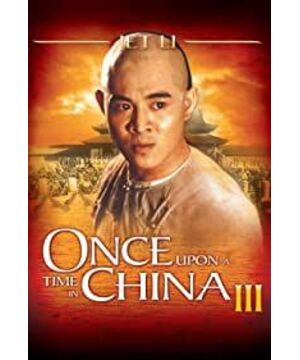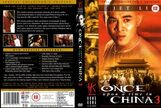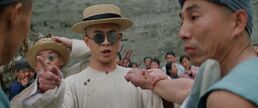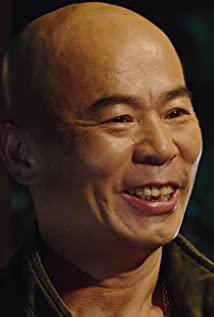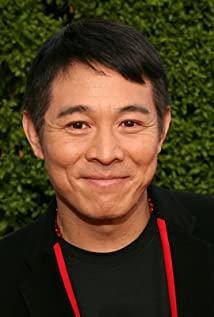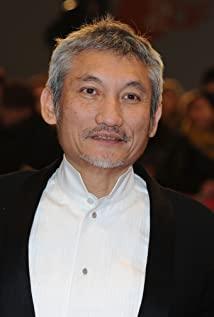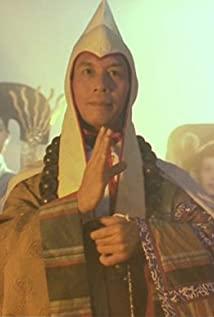Look at Tsui Hark's "The Lion King". I saw an interview with Jia Zhangke the other day, to the effect that Hong Kong films subtly influenced his movie view, and even said that "The Three Gorges Good Man" is completely the structure of a martial arts film: about finding and solving problems . I haven't seen any of Jia Zhangke's films, although I've always wanted to watch it, especially after visiting the Window of the World in Shenzhen, I really wanted to see his "The World", but I really didn't see it. I'm sure you'll see it sooner or later! Let alone Jia Zhangke. I watched "The Lion King" again a few days ago. Still at the Central Six Film Station. Recently, this station has been showing his and Jet Li's films - but CCTV's no matter what the film is, it will be played over and over again, and it is often broadcast in a way of changing the classification, such as the Tsui Hark series, or the Jet Li series. This may be repeated. Sex is great. I don't know how many times I've seen this movie. The earliest impression is that when I was reading Gao Xiao, there were still open-air movies. On the narrow road below the high stairs of our Gao Xiao, two tall poles were erected, and a big screen was hung between them. I remember that I didn't read it all, and when I started watching it, everyone was there saying "I love tiger oil" (I suddenly wondered if my memory was a little confused - because Gao Xiao didn't learn English, how did he know "I love tiger oil"? Rejection, whether it is a thing or a person; the third type is that it doesn’t matter to the arrival of the West, as long as it can benefit or does not affect one’s own benefit according to the previous state, there are many such people, basically speaking as a vague background, some Officials, a large number of underworld figures, their interests are inextricably linked with the Western powers, or as compradors, or colluded with white people to sell piglets, opium, or sell and buy arms, and oppress the people; the last and least people, It is a person of insight who has transformed from a sense of crisis into a sense of urgency and feels that they should selectively absorb Western technology and take the initiative to participate in the competition. There are a small number of officials (Li Hongzhang was portrayed as a similar character, which is probably not understood by many mainland audiences, but it is estimated that it is closer to his true appearance), there are also intellectuals like Sun Wen, and more National industrialists who directly face commercial competition, such as Huang Qiying, the treasurer of Baozhilin who bought steam engines, because they feel the pressure of competition more directly and more urgently. Huang Feihong is also portrayed here as such a positive character, although sometimes he acts like a charismatic person who blindly rejects the West (this may be something he made for the box office market in order to satisfy the national sentiment of the potential ordinary Chinese people. Some considerations), but once he recognizes the reality, under the guidance of Thirteenth Aunt, he can basically quickly accept Western things and make pragmatic choices. Is the reproduction of these types of people successful? Or can it represent the reality at that time? Because after all, we made films that reflected that era a few years later, and these Wong Fei-hung stories were basically made up by screenwriters, so is this analysis still meaningful for understanding that era at that time? Personally, I think it should be art that reproduces the situation in the past, and it can be used as a wake-up call or reference for people today. Many questions, in my opinion, should be avoided if commercial films are not meant to be. Commercial films should also have values, because they are works after all. If your values are not recognized, you will be spurned by the audience. The most typical example is the few famous garbage pieces that have been put together by famous mainland directors recently. This is reflected in my poor vision of Hollywood movies, because no matter how bizarre the plots are, these films have basically happy endings, and the themes are too evil. Tsui Hark's films can be said to fully reflect this orthodox value (the first thing I understand is that he is based on the orthodoxy of Hong Kong society), and what he focuses most on depicting the martial arts consciousness that has been cultivated in Chinese tradition - in When the country is in danger, it is necessary to help the society and the poor, just as Jin Yong said: The great man is the one who serves the country and the people. Using this standard to measure the mainland in recent years The so-called martial arts of these mainland directors are simply rubbish. Either get caught in the endorsement of the state system, or it is just a human flesh blender. The consciousness of martial arts corresponds to the consciousness of citizens. As long as citizens' distrust of the state system increases, martial arts consciousness will rise. Because the consciousness of martial arts is first manifested as a distrust of the state's public relief and an expectation for private relief. Although this awareness is nothing but a kind of self-satisfaction for readers and audiences, the healthy growth of this awareness also needs to be cultivated. The current popularity of martial arts in mainland China just shows that people now have the need for this kind of consciousness, but it is still immature. The era has no soil to grow. Fantasy is in power, and the rampant demons and ghosts are rampant. From one aspect, it can be seen as the abandonment of the modern society by the collective consciousness and the search for a substitute for spiritual satisfaction. There used to be a saying (it seems to be less common now) that Hong Kong is a cultural desert. But I believe more that if there is a cultural desert, it is not in Hong Kong. Or even if there is really a desert there (in terms of the small number of solid carriers of culture), then the people in the desert have a deeper understanding and desire for water. When Huang Feihong's Foshan Shadowless Foot was shown countless times in front of my eyes with various actors, I suddenly thought that it was these countless Huang Feihong of different appearances who were equally unafraid of rape, merging, inheriting civilization, The pioneering and innovative spirit has given China the power to rise continuously.
View more about Once Upon a Time in China III reviews


